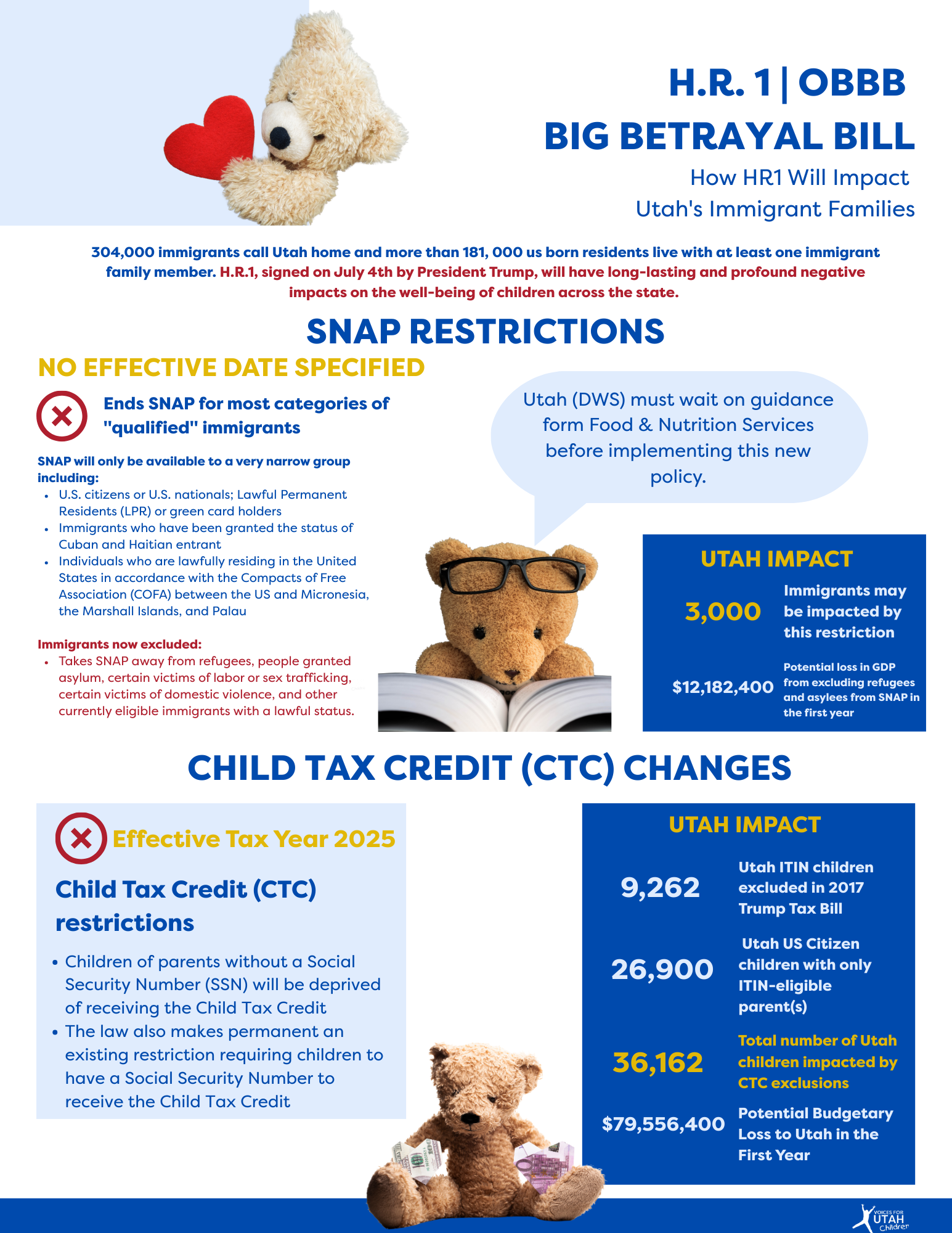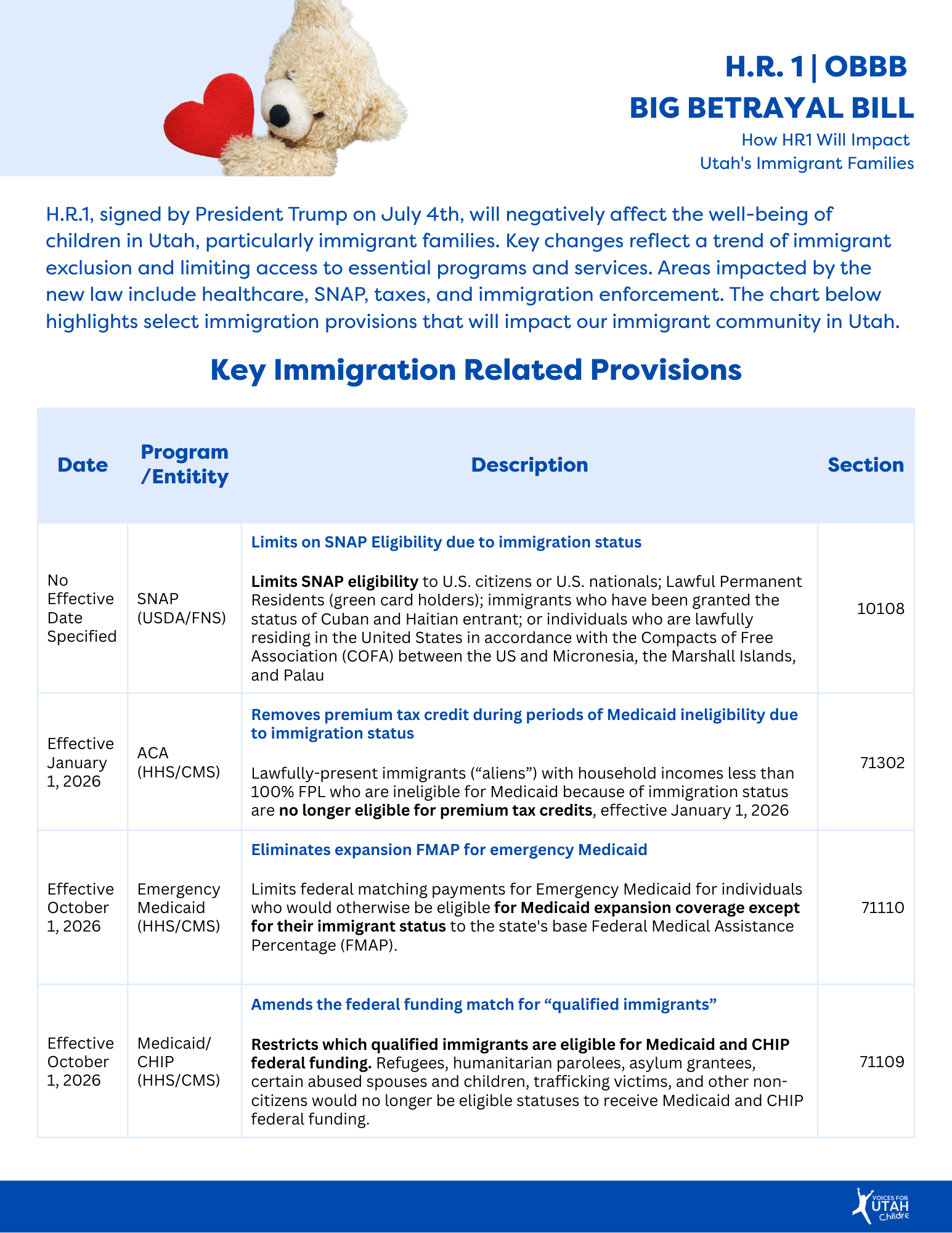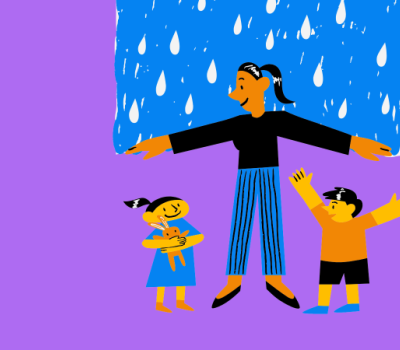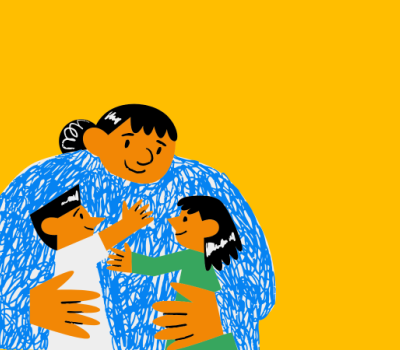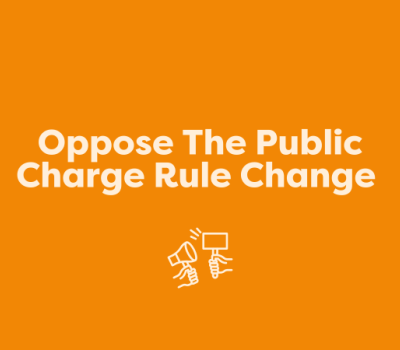What Immigrant Advocates and Families Need To Know About The Upcoming Changes
As we have begun to understand the impacts of the OBBB, which was signed into law on July 4th, we continue to raise our concerns about this bill’s negative impact on immigrant families in our state. Earlier this summer, we shared an overview of the bill’s key provisions that will harm Utah and immigrant children. As more information has been released, we wanted to share important details regarding how these provisions will impact us locally.
Utah is home to approximately 304,000 immigrants, with more than 181,000 U.S.-born residents who live with at least one immigrant family member. The upcoming changes our state will experience because of this law will bring long-lasting health and economic security consequences to individual families and communities. To be clear, the forthcoming changes will only weaken our healthcare system, strip coverage, remove access to nutrition programs, fund more deportations, and separate more families across our state.
Given the upcoming federal cuts, Utah has an opportunity to foster opportunities for immigrant families to thrive locally through state-based investments. We will ensure our efforts are centered on policies that support mixed-status and other immigrant families despite the upcoming federal restrictions we will see over the next few years.
Key Resources:
HR1 Webinar: How HR1 Will Impact Utah's Immigrant Families
On Friday, August 22nd Voices hosted a webinar for community advocates and shared information about the key provisions and timelines impacting Utah immigrants and their access to public programs and an overview of the increased immigration enforcement funding. The webinar shared similar information shared on this blog.
watch here
HR1 Provisions: Utah Impact Info Sheets
For a complete overview of how each provision of HR1 that will impact Utah immigrant families including key details, projected numbers, and timelines for implementation, download our Impact Sheet below.
HR1 Provisions: Timeline Chart
See our chart for a snapshot of the provisions that will impact Utah immigrant families with implementation dates, impacted entities and sections of the bill, and other key data.
Upcoming Changes + Utah Impacts
Child Tax Credit (CTC) Restrictions
The OBBB's exclusions on the annual Child Tax Credit (CTC) will impact approximately 36,162 children. Effective during the Tax Year 2025, the OBBB will exclude children who do not have Social Security Numbers or are Individual Tax Identification Numbers (ITIN) holders. Additionally, children of parents without a SSN will also be excluded from the CTC.
- Over 9,000 children with Individual Tax Identification Numbers (ITIN) were impacted by the 2017 Trump Tax Bill. This law now makes that exclusion permanent.
- Approximately 26,900 U.S. Citizen children in Utah with only ITIN-eligible parent(s) will be impacted.
Healthcare Restrictions
According to the Department of Health and Human Services, the OBBB changes may reduce the number of Medicaid and CHIP clients by approximately 5,400 individuals. This change, alongside other key healthcare provisions such as work requirements, retroactive coverage limitations, and more frequent eligibility checks, will profoundly impact how Utah immigrants access care.
- It is estimated that the OBBB will reduce federal funds for Emergency Medicaid services for around 1,100 individuals
- The average increase in the monthly premium for those who lose access to the Advanced Premium Tax Credit (APTC) will be approximately $462
While this blog focuses on the changes that directly impact immigrants, many will affect low-income families across the state, including immigrant families. Some of these changes include lowering the amount states can collect in provider taxes, adding work requirements for many adults in the expansion program, and delaying new rules to make applying and renewing coverage easier. It also limits how far back people can get retroactive coverage and requires more frequent eligibility checks, among other provisions.
For more information on the other health care changes, visit: Utah Kids Pay the Price for Health Care Cuts
Immigration Policy Changes
The OBBB allocates over $170 billion for immigration and border enforcement through 2029. From increased ICE enforcement and funding for deportations to increased fees for status adjustments and changes for how unaccompanied children are going to be treated, these policy changes will have a long-lasting negative impact on immigrant families across our state.
- 197 unaccompanied minors have been released to sponsors in Utah this year
- We worry that increased funding will mean more county sheriff's offices will sign new agreements. Currently, nine County Sheriff's Offices (Beave, Cache, Kane, Sanpete, Tooele, Wasatch, Washington, Weber), Riverton Policy Department, and the Department of Corrections in Utah have 287(g) agreements.
Supplemental Nutrition Assistance Program (SNAP) Restrictions
The OBBB Law ends SNAP for most categories of "qualified" immigrants. In Utah, approximately 3,000 immigrants may be impacted by these restrictions. SNAP and other nutrition programs play a vital role in the health and wellness of children in Utah. In Utah, approximately 56% of SNAP households have children, and 51% of households had a person with disabilities.
As families grapple with the change and possible loss of access to this program, we encourage them to visit Utahns Against Hunger and the Utah Immigrant Advocacy Coalition Websites for information about food pantry programs near them.
What's Next?
As implementation dates draw near, we hope to work with key community leaders and policymakers to ensure families understand what the changes mean to their unique situations so they can find alternative options to receive the services they need. Our efforts will focus on supporting state-based solutions that meet the needs of Utah immigrant families and measuring the negative impacts these changes and restrictions will have on families and our state. While some of these changes will affect people at the individual level, we understand that these provisions will also have a significant impact on our health care systems, economy, and communities. While policy shifts have restricted immigrants’ access to certain programs and services, our commitment to ensuring Utah is a place where all children, regardless of their place of origin, remains. We will continue to advocate for a Utah that is a welcoming place for all.


